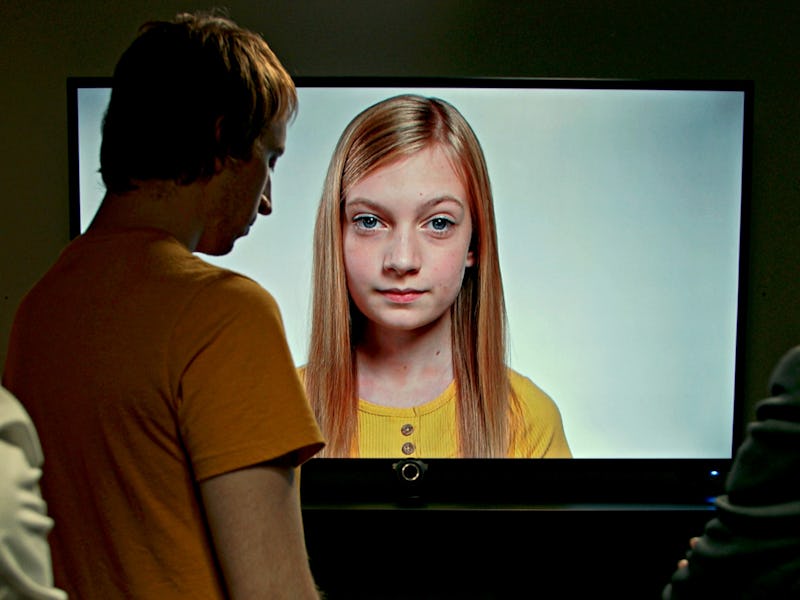The Artifice Girl Finally Gives Us a Non-Alarmist AI Story
Fearmongering is rampant in AI sci-fi stories. For once, it's nice to see one where the flaw is in the human.

AI focused-stories, much like the AI at the center of them, are getting out of control. Now that students are using ChatGPT to skirt their homework and “grandma hacks” are subverting OpenAI’s most strict restraints on its own technology, sci-fi is doing what it does best — extrapolating to the worst possible scenario.
Black Mirror’s “Be Right Back” imagined a world where androids could be trained by dead loved ones’ digital presences to essentially replace them. Mrs. Davis, Peacock’s latest series with Damon Lindelof, paints a world where an AI has taken over the world and sends users on missions for the elusive reward of “wings.” Even M3GAN used its sassy girly AI for its own spooky benefit.
But there’s another, more difficult angle to finagle when it comes to artificial intelligence: reckoning with how we define sentience and how we define human-ness. The Artifice Girl approaches the finer nuances of why the concept of AI is so frightening in three distinct chapters.
In the first two chapters, writer/director Franklin Ritch plays Gareth, a CG and AI expert who presumedly worked on the model for Moff Gideon in Rogue One. (We’re just told he worked on a Star Wars movie to create a model for an actor who died.) After, he decided to dip his toes into the vigilante justice field by creating Cherry (Tatum Matthews), an AI-generated girl who uses rudimentary language models to bait child predators without endangering any “real” people.
The first chapter is set in the near future, but the second is set decades after, where Gareth argues with two nonprofit execs about the possibility to upgrade Cherry into an android. While the first chapter has a feel of a claustrophobic interrogation, the second employs the masterful dialogue of a one-act play, putting three characters in a room with one driving question: Can they, and should they, obtain Cherry’s consent to move her into the physical world?
The entire tone of Cherry — and the movie at large — changes around the exact midpoint of the film, and from there it’s clear that this AI is more than the CGI model-equipped bot we saw in the first chapter but something intangibly more. It doesn’t really matter how that happened, the characters simply take it at face value.
Gareth is interrogated about Cherry’s whereabouts in the first chapter of The Artifice Girl.
Cherry isn’t out to take over the world. She’s not even trying to replicate something in people’s lives. She’s just trying to make her creator Gareth proud by serving her prime directive of protecting children. She even says, “Human nature isn’t something I aspire to.”
At the end of the day, even if she has blurred the line between human and technology, she’s still a child, and children are blessed and burdened with the flaws of those who raise them. In the final of the three chapters, set far off in the future, Cherry finally confronts Gareth about why he created her and why he created her to look like she does. When that mystery is revealed, everything snaps back into place.
AI may just be code created by humans, but it's also the mirror with which we look through our own problems. The entire point of technology, from the wheel to the self-driving car, is that it aspires to solve a problem. In the case of The Artifice Girl, that problem isn’t the one we thought.
This movie recognizes that AI is scary and intimidating, but it also recognizes how that fact says more about human nature than it does some looming technological overlord. Maybe one day AI could write movie reviews, but only I, a human, could watch a film and have it elicit worry that my job could become irrelevant. It’s this humanity that this film touches on, and then twists deliciously.